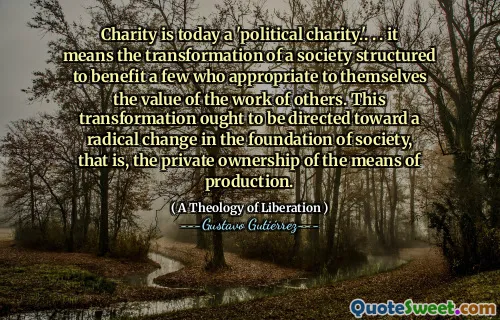Gustavo Gutiérrez is a prominent Peruvian theologian widely known for his significant contributions to liberation theology, a movement that emphasizes social justice and the preferential option for the poor. Born in 1928, he has dedicated his life to addressing the issues of poverty and systemic injustice within the Latin American context. His seminal work, "A Theology of Liberation," published in 1971, challenges conventional theological practices, advocating for a faith that actively engages with the struggles of the marginalized. Throughout his career, Gutiérrez has integrated his theological insights with pastoral work, emphasizing the importance of communal action in pursuing justice. He posits that true faith must engage with the lived realities of the oppressed, promoting a vision of the Church as a vehicle for social change rather than merely a spiritual institution. His perspectives have influenced countless activists and theologians across Latin America and beyond, inspiring a generation to seek alternatives to structural inequalities. Gutiérrez's life and work underscore the intersection of faith and justice, encouraging a critical examination of socio-economic inequalities. By positioning the voices of the poor at the center of theological discourse, he has redefined the role of faith in contemporary society. His legacy continues to inspire those who fight for dignity and justice in the face of oppression.
Gustavo Gutiérrez is a renowned Peruvian theologian best known for his pivotal role in liberation theology, which focuses on social justice and prioritizing the needs of the impoverished. Born in 1928, his work emphasizes the critical intersection of faith and activism against systemic oppression.
Gutiérrez's 1971 book "A Theology of Liberation" challenges traditional theological methods, promoting an active engagement with the struggles of marginalized communities. He argues for a vision of the Church that acts as a catalyst for social change rather than a mere religious institution.
Through his life and writings, Gutiérrez has inspired many to work toward justice, advocating for the voices of the poor to be central in theological discussions. His legacy is a call to action for faith communities to address social injustices and strive for a more equitable society.
More »
Today Birthdays
1729 -
Edmund Burke
1949 -
Haruki Murakami
1954 -
Howard Stern
1876 -
Jack London
1993 -
Zayn Malik
1951 -
Kirstie Alley
1863 -
Swami Vivekananda
1923 -
Alice Miller
1987 -
Naya Rivera
1825 -
Brooke Foss Westcott
1944 -
Joe Frazier
1951 -
Rush Limbaugh
1964 -
Jeff Bezos
1978 -
Jeremy Camp
1628 -
Charles Perrault
1856 -
John Singer Sargent
1970 -
Kaja Foglio
1953 -
Rick Santelli
1986 -
Gemma Arterton
1968 -
Raf Simons
1958 -
Christiane Amanpour
1966 -
Olivier Martinez
1996 -
Ella Henderson
1917 -
Maharishi Mahesh Yogi
1949 -
Ottmar Hitzfeld
1928 -
Ruth Brown
1968 -
Heather Mills
1946 -
George Duke
1968 -
Rachael Harris
1923 -
Ira Hayes
